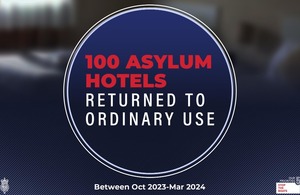100th asylum hotel set to close next week
Home Secretary delivers on plan to reduce use of asylum hotels with 100 asylum hotels returned to communities by next week, up from 60 at the end of January.

One hundred asylum hotels will be closed by the end of March as part of the government’s plan to stop the boats and cut the use of hotels in the asylum system.
The Home Office is expected to close the 100th hotel next Friday (29th March) having moved people into other accommodation such as large sites and the private rented sector.
This means there are 20,000 fewer asylum seekers in hotels today than six months ago, down from over 56,000 at the end of September 2023, a reduction of 36%.
Hotel accommodation, which currently costs £8.2 million a day, has always been intended as a temporary solution to ensure the Home Office meets the statutory obligation to accommodate asylum seekers who would otherwise be destitute during a period of unprecedented numbers of small boat arrivals.
This delivers on the government’s plan to reduce our reliance on hotels to house asylum seekers. The first 60 hotels were closed in January.
The Home Office has also made significant progress in maximising the number of bed spaces in the existing asylum estate and clearing the legacy backlog of applications, with around 100,000 cases processed, including over 74,000 substantive decisions.
Home Secretary James Cleverly said:
Five months ago, we promised to reduce the use of hotels, return them to their local communities and resume their ordinary use. Today is proof that our plan to stop the boats, maximise efficiencies across the asylum accommodation estate and move asylum seekers to more sustainable accommodation is working.
The Home Office continues to negotiate with a range of accommodation providers to find the cheapest accommodation to ensure the greatest value for money and reduce reliance on hotels. Such accommodation relieves pressure on communities and manages asylum seekers in a more appropriate way, bringing the UK in line with the approach taken by other countries in Europe.
Large sites, such as former military sites and barges, reduce demand on an already pressured private rental market and their larger capacity allows the Home Office to be agile in responding to fluctuations in demand.
The reduction in hotel use is just one part of the government’s relentless action to reduce the strain illegal migration continues to place on British taxpayers. Ultimately the best way to save money is by deterring people from coming to the UK illegally in the first place, and our partnership with Rwanda intends to do just that.
Government action to crack down on criminals, deter migrants from making dangerous crossings and, alongside our French counterparts, intercept vessels, saw a reduction in small boat crossings by 36% last year. The government also continues to run campaigns to deter would-be migrants from beginning perilous journeys.
A hotel is considered closed for housing asylum seekers once our contract with it has ended. The future of these hotels is decided by the hoteliers.
The data on the number of asylum seekers in hotels is provisional. Finalised data to the end of March 2024 will be published in the quarterly Immigration System Statistics